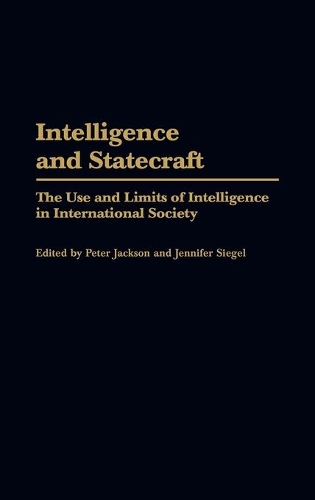
Intelligence and Statecraft: The Use and Limits of Intelligence in International Society
(Hardback)
Publishing Details
Intelligence and Statecraft: The Use and Limits of Intelligence in International Society
By (Author) Peter Jackson
By (author) Jennifer Siegel
Bloomsbury Publishing PLC
Praeger Publishers Inc
30th April 2005
United States
Classifications
Professional and Scholarly
Non Fiction
327.12
Physical Properties
Hardback
302
Width 156mm, Height 235mm
595g
Description
Demonstrates that studying the history of intelligence enriches our understanding of its role in international relations today Intelligence has never been a more important factor in international affairs than it is today. The 9/11 commission in the US, and the Hutton Report in Britain, have placed intelligence, and its (mis)use by politicians, at the heart of political debate. Since the end of the Second World War, vast intelligence bureaucracies have emerged to play an increasingly important role in the making of national policy within all major states. One of the biggest problems within the contemporary thinking about intelligence and international relations is a lack of historical context. Observers routinely comment on the challenges facing intelligence communities without reflecting on the historical forces that have shaped these communities over the past two centuries. Intelligence and Statecraft explores the constant nature and limits of intelligence, and examines how the practices of intelligence collection and analysis have remained essentially unchanged since the Roman era - rendering intelligence little or no more effective in reducing uncertainty at the dawn of the twenty-first century than in centuries past. The contributors in this volume consider the causes and consequences of this as well as its impact on war, strategy, and statecraft. The new perspectives presented in this volume on the evolution of intelligence services and intelligence practice over the past 200 years can only enrich ongoing debates over how best to reform national intelligence structures.; Places modern controversies over intelligence in their historical context
Reviews
[T]races the rise and development of the military attache from the nineteenth century and links this to the increasing demand for intelligence generated by the requirements of modern war.[f]ascinating new tidbits of information. This remains a fertile field for cultivation. * The Journal of Military History *
Author Bio
PETER JACKSON is Senior Lecturer in International Politics in the Department of International Politics at the University of Wales, Aberystwyth. JENNIFER SIEGEL is Assistant Professor of History at Ohio State University.
